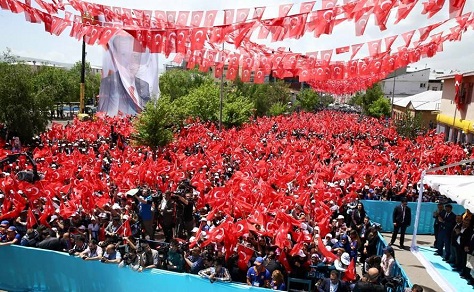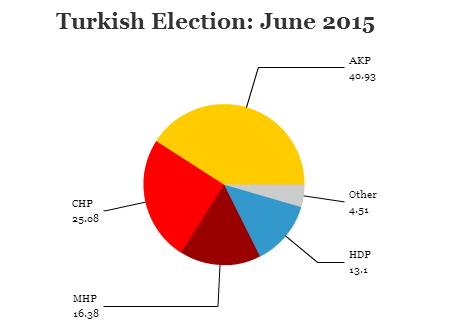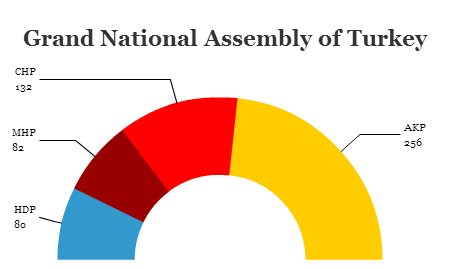The hand-wringing about Turkish democracy turned out to be overwrought — electoral churn is alive and well, despite the efforts of its president, Recep Tayyip Erdoğan, to consolidate the power of his ruling party, the Adalet ve Kalkınma Partisi (AKP, the Justice and Development Party).![]()
For the first time since the AKP came to power in 2002, Erdoğan wasn’t technically leading the party after winning the presidency last year. Nevertheless, his presence was clear enough in the weeks leading up to the vote, threatening journalists and campaigning openly in defiance of the traditional independence of the office of the presidency, which Erdoğan hoped to strengthen significantly by changing Turkey’s constitution.
* * * * *
RELATED: Turkish election a referendum on
Erdoğan-style presidentialism
RELATED: Who is Selahattin Demirtaş?
* * * * *
Erdoğan hoped to win the 330 seats necessary to initiate constitutional changes to shift power permanently to the presidency and away from the assembly. Instead, the AKP fell to just 256 seats, 20 short of a majority. While that’s enough for the AKP to remain the largest party, by far, in the Türkiye Büyük Millet Meclisi (Grand National Assembly), voters rewarded Erdoğan’s overreach by forcing the AKP to seek a coalition partner, a novelty after nearly a decade and a half of one-party rule.
Accordingly, the results bring more questions than answers. Though the election is probably good for the long-term stability of Turkish democracy, the result could mean a considerable amount of short-term instability, a prospect that’s already spooked Turkish markets this morning.
For the first time in Turkish history, an explicitly Kurdish party will hold seats (as a party) in the Turkish parliament. It’s a great opportunity for political pluralism, but it also brings risks. If Erdoğan turns too sharply against his Kurdish rivals, he could tragically damage the strengthening trust that he’s built over the past decade between the Kurdish minority and the Turkish government.
Prime minister Ahmet Davutoğlu, Erdoğan’s former foreign minister, had pledged to resign in the event that the AKP failed to win enough seats to form a government, so his future is very much in question. If he goes, Erdoğan will be hard-pressed to find a reliable ally who satisfies both wings of the AKP and who will also govern in deference to Erdoğan’s wishes.
Moreover, shifting to coalition politics will prove difficult for the AKP, most especially Erdoğan. Even if he manages to find a junior coalition partner, Erdoğan might be anxious to hold new elections to restore the party’s majority. As much as the June 7 elections affirmed the resilience of Turkish democracy, snap elections might prove an even more serious test if Erdoğan is willing to resort to extralegal steps — especially after he flouted presidential impartiality and the AKP devoted significant state resources to its election victory.
Erdoğan, over the years, has gradually consolidated authority into a narrowing group of advisers, to the point that he’s sidelined senior AKP figures, including co-founders like deputy prime minister Bülent Arınç and former president Abdullah Gül, who might otherwise challenge his authority. Increasingly, Erdoğan gradually shifted away from democratic best practices that emphasize liberal freedoms and consensus-building. Turkish voters are also becoming impatient with a slowing economy after years of booming expansion. Continue reading Coalition politics returns to Turkey after AKP loses majority


